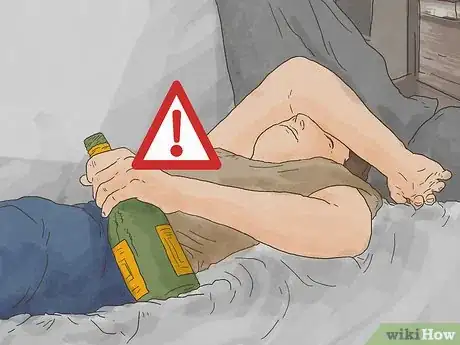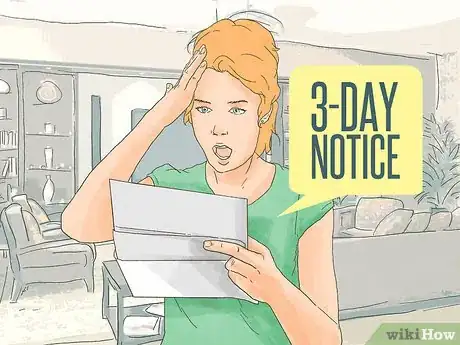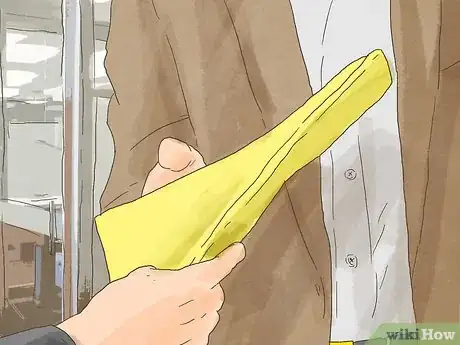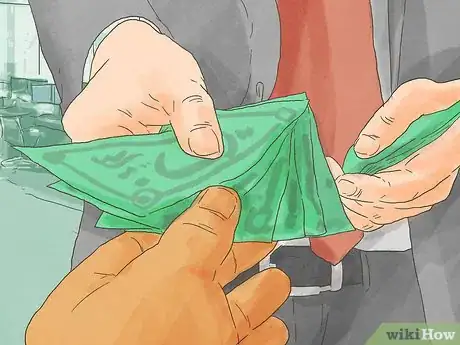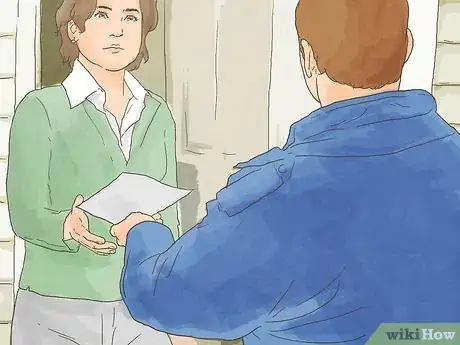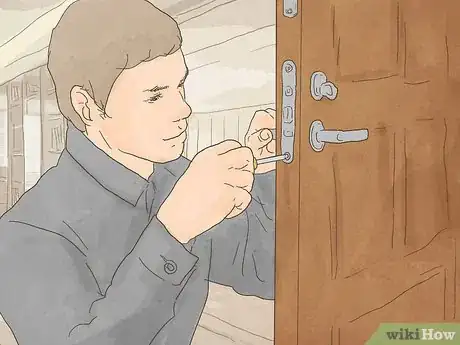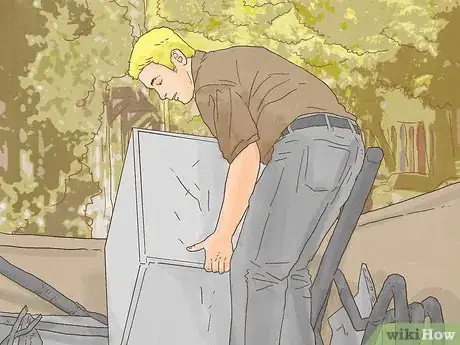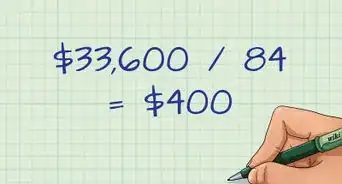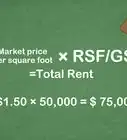This article was co-authored by Clinton M. Sandvick, JD, PhD. Clinton M. Sandvick worked as a civil litigator in California for over 7 years. He received his JD from the University of Wisconsin-Madison in 1998 and his PhD in American History from the University of Oregon in 2013.
This article has been viewed 86,074 times.
Under California law, landlords have the right to evict commercial tenants who fail to make rent payments or otherwise breach the lease agreement. Commercial tenants do not enjoy the same legal protections as residential tenants but due to the value of the property, may be more capable of hiring a lawyer to defend themselves. While evicting a tenant is rarely easy, by following the proper procedure you can save yourself months of legal hassle and expenses.
Steps
Avoiding a Legal Battle
-
1Make sure you have legal reason to evict the tenant. Commercial eviction proceedings are most often the result of a breach of contract. While in some cases this is due to a landlord's dissatisfaction with the tenant's use of the property, it is usually just a matter of rent default.[1]
- The main issue in deciding whether or not an eviction is legal is whether or not the rental agreement has been breached. The rental agreement will likely include items detailing rent paid, dates rent payments are due, acceptable uses of the property, and other details as the landlord sees fit. Any breach of this contract by the renter is grounds for an eviction proceeding.[2]
-
2Call the tenant or speak to them personally. Most people are willing to work out some kind of compromise before going to court. Try to talk to your tenant before taking any sort of legal action. They may simply be having a rough month and need more time to pay rent.Advertisement
-
3Draft a "3-day notice." This legally-required document is your warning of legal action if the tenant continues to not pay their rent or will not stop the lease agreement violation. It must include the amount of rent due, the name and address of the person to whom the rent payment can be made, and a notice of forfeiture of the lease if the payment is not made within three days of receipt of the notice.[3]
- Even though a commercial tenant in California may be legally required to pay up to a 20% premium on rent payments, be careful what amount you require from the tenant in the notice.[4] If the tenant pays an overestimated rent payment, the tenant will likely win the eviction proceedings and be able to sue for legal fees.
- Have an attorney who is familiar with tenant law in your area assist you with this notice if you are unfamiliar with how to draft this notice.
-
4Serve the 3-day Notice to the tenant. If you are unable to serve the tenant personally, try leaving the notice with someone over the age of 18 at the premises and mailing an additional copy to the tenant. If this cannot be done, you can post the notice in an easily visible location at the property and mail an additional copy to the tenant.[5]
- The effective date of the notice may change based on how the notice was served. If the tenant is served directly, the effective date remains at three days. However, if the notice is mailed or provided in another other way than directly, it is advisable to add another five days from the date of mailing.[6]
-
5Complete a "Proof of Service" form. This can be used to prove your service of the 3 Day Notice if the issue is taken to court.
- If you served the eviction notice by mail, use the form found here.
-
6Allow the tenant an opportunity to remedy the situation. The tenant has 3 full days after the notice has been served to remedy the situation. If the end of this period falls on a holiday or weekend, the end of the period shall officially be the next business day. Continue with the eviction process if the situation is not remedied.
- If the tenant pays a partial rent payment, the landlord is required to inform them in writing that the landlord's accepting the partial rent payment does not exempt the tenant from eviction proceedings.
Taking the Case to Court
-
1File an Unlawful Detainer Complaint. If the tenant still has not paid the rent due or stopped the violation of the lease agreement within the three days, the landlord now has the right to file an Unlawful Detainer Complaint. This is a form filed with the court that officially begins the eviction process. Because of the complex nature of commercial eviction filings and legal forms, it is advised that you hire a real estate attorney to ensure accuracy. Any inaccuracies may be successfully challenged by the tenant.
- If you choose to continue with this process yourself, file the following documents with the court:
- A copy of the lease agreement
- The Unlawful Detainer Complaint
- A copy of the 3 day notice
- Proof of service of the 3 day notice
- Other legal forms may be required. Seek legal advice from a professional or check if free advice is available at the courthouse before proceeding.
- If you choose to continue with this process yourself, file the following documents with the court:
-
2Allow the tenant 5 days to vacate the property. The tenant will be served a Summons (a requirement of response to the court) by a registered process server. If the document is delivered in person, the tenant has five days to vacate the property or respond to the summons. If the tenant was served in another way, they may have 10 to 15 days to respond.
- If the tenant vacates the property or otherwise doesn't content the eviction, your lawyer can then seek a default judgement of possession from the court, meaning that the tenant is now evicted.
-
3Take the issue to trial. If the tenant responds to the summons by contesting the eviction, your attorney (if you have one) and your tenants attorney (if they have one) will seek to set a court date for the trial. This is usually within 30 days of the tenant's response.
- If the case is taken to trial, it is highly advisable that you hire an attorney to defend yourself. The tenant may have powerful legal defenses and can sue you for legal fees if they win the case.
- If you (the landlord) win the trial, you will awarded unpaid rent and any other losses as specified in the lease agreement. The tenant may ask for up to 41 extra days at the property if they lose, but will be forced to pay the appropriate amount of rent up front.
-
4Have the local Sheriff serve a "5-day Notice to Vacate" to the tenant. If the tenant loses the case, the Sheriff's office will awarded the right to carry out the eviction.
-
5Have the Sheriff place a lock on the door to the rental property. On the sixth day, the Sheriff has the right to physically remove the tenant if they are still present on the property. At this time, a receipt of possession of the property is given to the landlord and they may elect to change the locks on the property.
-
6Have the tenant claim any remaining possessions. The tenant has 15 days after the lockout to claim any remaining property on the premises. Or, if the tenant left before the lockout, allow 18 days after the mailing of a "Notice of Belief of Abandonment" to their last known address. This notice must specify the property remaining and any storage costs.
- The tenant's property must be safely stored during this time. It is a good idea to photograph the property to avoid charges of negligent destruction of property.
-
7Get rid of the tenant's possessions. The unclaimed property may be sold or disposed of by the landlord. This varies my municipality. See your local court website or seek legal advice for more information.
Warnings
- This article is not meant to replace professional legal counsel or constitute legal advice. If in doubt, seek legal help for your eviction proceeding.⧼thumbs_response⧽
- Remaining possessions on the premises may not be used as security to ensure the payment of money awarded by the court.⧼thumbs_response⧽
References
- ↑ http://www.legalmatch.com/law-library/article/evicting-a-commercial-tenant-in-california.html
- ↑ http://www.caltenantlaw.com/Bus-Law.htm#Eviction
- ↑ http://bayarearealestatelawyers.com/eviction/commercial-evictions-the-three-day-notice/#.Vh-kKxNViko
- ↑ http://www.legalmatch.com/law-library/article/evicting-a-commercial-tenant-in-california.html
- ↑ http://bayarearealestatelawyers.com/eviction/commercial-evictions-the-three-day-notice/#.Vh-kKxNViko
- ↑ http://bayarearealestatelawyers.com/eviction/commercial-evictions-the-three-day-notice/#.Vh-kKxNViko
